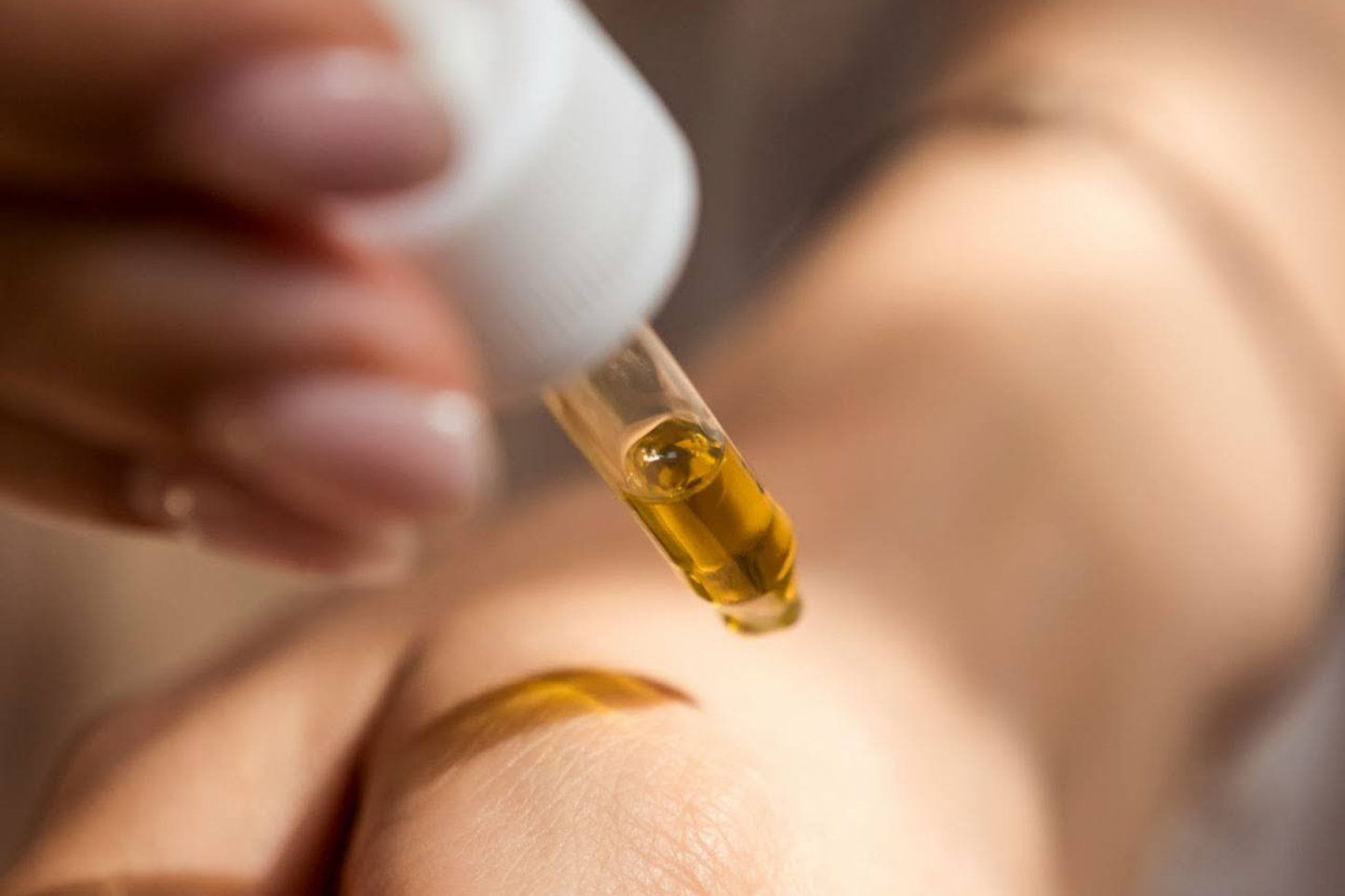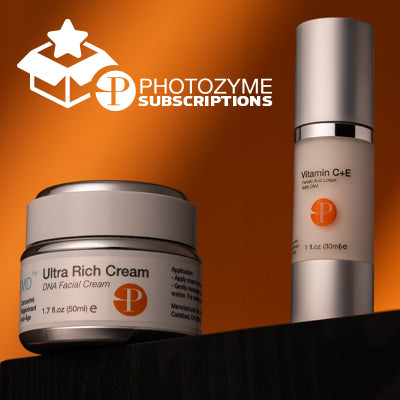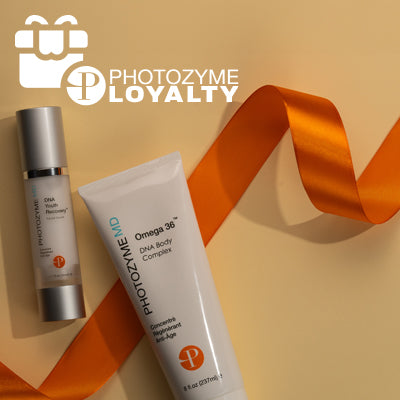
Key Takeaways:
- Polysorbate 80 is a Common Ingredient in Skincare and Cosmetics: Polysorbate 80 is a synthetic compound that is derived from ethylene oxide and sorbitan monostearate.
- Polysorbate 80 Acts as a Stabilizer, Solubilizer, and Emulsifier: This compound helps make mixtures uniform and stable. It also helps your skin to absorb the product’s active ingredients.
- Polysorbate 80 Makes Products Shelf Stable: This compound helps to make skincare products and cosmetics last longer without sacrificing their effectiveness.
Polysorbate 80 is a common ingredient found in a wide range of skincare and cosmetic products, but what exactly is it and why is it used? In this article, we will take a look into the world of Polysorbate 80 to uncover its properties, benefits, and potential concerns.
Photozyme, as a specialty skincare company dedicated to providing innovative products for skin health, understands the importance of knowing the ingredients in the products we use on our skin. Polysorbate 80 is often included in skincare formulations due to its emulsifying properties, helping ingredients blend together seamlessly. With our focus on high-quality products marketed to professional physicians worldwide, we prioritize educating our customers on the key components of skincare products they may encounter.
Whether you're a skincare enthusiast, a professional in the aesthetics industry, or simply curious about the ingredients in your favorite beauty products, understanding Polysorbate 80 can empower you to make informed choices about the products you use on your skin. Join us as we explore the world of Polysorbate 80 and its role in the skincare products we love.
The Role Of Polysorbate 80 In Skincare
Polysorbate 80 is a common ingredient found in a wide range of skincare, cosmetic, and pharmaceutical products. Also known as Tween 80, it is a synthetic compound derived from ethylene oxide and sorbitan monostearate. This versatile substance acts as an emulsifier, stabilizer, and solubilizer, making it a valuable addition to various formulations.
One of the key functions of Polysorbate 80 is its ability to blend oil and water-based ingredients together. This emulsifying property is crucial in skincare products as it allows for the creation of stable and uniform mixtures. By helping to combine substances that would otherwise separate, Polysorbate 80 contributes to the overall effectiveness and consistency of the product.
Furthermore, Polysorbate 80 plays a role in improving the absorption of active ingredients into the skin. Its solubilizing properties enhance the bioavailability of key components, ensuring better penetration and efficacy. This attribute is particularly beneficial in formulations where optimal skin absorption is desired for maximum results.
In addition to its emulsifying and solubilizing abilities, Polysorbate 80 also acts as a stabilizer in many cosmetic products. By helping to maintain the homogeneity and texture of formulations, it extends the shelf life of products and preserves their overall quality.
Overall, Polysorbate 80 is a versatile ingredient that performs multiple functions in skincare and cosmetic formulations. Its emulsifying, solubilizing, and stabilizing properties make it a valuable component in many products, contributing to their effectiveness and performance.
The Science Behind Polysorbate 80: Composition And Properties
Polysorbate 80 is a versatile and widely used surfactant in various industries, including pharmaceuticals, food, and cosmetics. Composed of sorbitol, ethylene oxide, and fatty acids derived from vegetable sources, polysorbate 80 is valued for its emulsifying, solubilizing, and stabilizing properties.
One of the key characteristics of polysorbate 80 is its hydrophilic-lipophilic balance (HLB) value of around 15. This balance allows it to effectively bind both water and oil-based ingredients, making it a popular choice in formulations where ingredients with different solubilities need to be blended seamlessly. This property is especially beneficial in skincare products, where water and oil phases must be combined to create stable emulsions.
In addition to its emulsifying properties, polysorbate 80 is known for its ability to enhance the permeability of cell membranes. This feature is particularly valuable in pharmaceutical applications, where it can improve the absorption of drugs and nutrients in the body. In skincare products, this enhanced permeability can aid in the delivery of active ingredients, ensuring better efficacy and results for the user.
Furthermore, polysorbate 80 exhibits excellent stability and resistance to oxidation, making it a reliable ingredient for formulators seeking to extend the shelf life of their products. Its ability to inhibit the growth of microorganisms also contributes to its role as a preservative in various formulations, ensuring product safety and longevity.
Overall, the unique composition and properties of polysorbate 80 make it a valuable ingredient in a wide range of industries, from skincare to pharmaceuticals, where its versatility and performance can enhance the efficacy and stability of formulations.
|
Why DNA Repair Matters Also known as photodamage, the skin’s DNA is very susceptible to damage from UV light. Avoid the consequences of UV exposure. 80% of skin aging is due to the sun and no sunscreen is 100% effective. Your skin’s DNA is subject to daily environmental assaults accelerating skin aging. Your body can only process and repair about 50% of this damage in any given day. However, your skin is not defenseless against this damage. Where Photozyme Comes In Thanks to our DNA Enzyme Technology, our products utilize a targeted delivery of natural repair enzymes to help prevent the signs of skin aging from surfacing. These enzymes are:
Why Sunscreen Is Not Enough Below you will see a bar chart referencing why sunscreen is simply not enough. Researchers intended to study the exposure of human skin to ultraviolet radiation (UVR). UVR exposure results in the formation of DNA photolesions which eventually give rise to photoaging, mutations, cell death, and even carcinogenic events. However, when a DNA repair enzyme, such as photolyase, is introduced it works to reverse damage caused by that UVR exposure. The intention was to investigate if the addition of photolyase works to enhance the protection of sunscreen. After testing, they found that photolyase with the addition of sunscreen was superior to only using sunscreen alone. The major finding (shown below) gives weight to the thinking that photolyase is a helpful addition to your skincare routine. This may make a world of difference as we all work to prevent UVR-induced DNA damage.

Reference: Berardesca E, Bertona M, Altabas K, Altabas V, Emanuele E. Reduced ultraviolet-induced DNA damage and apoptosis in human skin with topical application of a photolyase-containing DNA repair enzyme cream: clues to skin cancer prevention. Mol Med Rep. 2012 Feb;5(2):570-4. doi: 10.3892/mmr.2011.673. Epub 2011 Nov 11. PMID: 22086236. |
Exploring The Benefits Of Polysorbate 80
Polysorbate 80 is a versatile ingredient that offers numerous benefits in skincare products. One of the key advantages of polysorbate 80 is its emulsifying properties. This means that it helps to blend ingredients that wouldn't normally combine well, allowing for a stable and uniform product. In skincare formulations, this is crucial for achieving the right texture and consistency, ensuring that the product applies smoothly and evenly onto the skin.
Another benefit of polysorbate 80 is its ability to increase the solubility of other ingredients. This is particularly useful for products that contain both water-soluble and oil-soluble ingredients. Polysorbate 80 helps to disperse and dissolve these components effectively, enhancing the overall efficacy of the product.
Additionally, polysorbate 80 is known for its moisturizing properties. It helps to hydrate and condition the skin, leaving it feeling soft and supple. By incorporating polysorbate 80 into skincare formulations, manufacturers can create products that not only deliver active ingredients effectively but also provide a nourishing and moisturizing experience for the skin.
Furthermore, polysorbate 80 is often used in skincare products for its mild and gentle nature. It is generally well-tolerated by most skin types, making it suitable for a wide range of consumers, including those with sensitive skin. This versatility and compatibility make polysorbate 80 a popular choice for formulators looking to create products that cater to various skin concerns without causing irritation.
Overall, the benefits of polysorbate 80 make it a valuable ingredient in skincare formulations, offering emulsifying, solubilizing, moisturizing, and skin-friendly properties that contribute to the efficacy and appeal of the final products.
Debunking Myths: The Safety Of Polysorbate 80
There have been debates and concerns surrounding the safety of Polysorbate 80, especially in skincare products. Let's explore some common myths and misconceptions to understand the true facts behind this ingredient.
Myth: Polysorbate 80 Is Harmful To The Skin
It's important to dispel the myth that Polysorbate 80 is harmful to the skin. In reality, Polysorbate 80 is considered safe for topical use in skincare products, including lotions, creams, and serums. It is commonly used as an emulsifier and surfactant, helping to stabilize product formulations and improve texture without causing harm to the skin.
Myth: Polysorbate 80 Is Linked To Cancer
There is no scientific evidence to suggest that Polysorbate 80 is linked to cancer. Extensive research and regulatory agencies, including the FDA and the Cosmetic Ingredient Review (CIR) Expert Panel, have deemed Polysorbate 80 safe for use in cosmetics and skincare products. It is essential to rely on credible sources and scientific data when evaluating the safety of ingredients like Polysorbate 80.
Myth: Polysorbate 80 Is Not Vegan-Friendly
Contrary to popular belief, Polysorbate 80 is a vegan-friendly ingredient. It is derived from sorbitol and oleic acid, making it suitable for use in vegan skincare products. Polysorbate 80's versatility and compatibility with various formulations make it a popular choice among formulators seeking effective and ethical ingredients.
It is crucial to separate fact from fiction when it comes to skincare ingredients like Polysorbate 80. By addressing common myths and misconceptions, we can make informed decisions about the products we use on our skin. Remember to consult with skincare professionals and dermatologists for personalized recommendations based on your skin type and concerns.
Regulatory Perspective: FDA Stance On Polysorbate 80
Polysorbate 80 is a common ingredient found in a variety of skincare products and medications. Its versatility and properties make it a popular choice for manufacturers, but what is the FDA's stance on the use of Polysorbate 80 in these products?
According to the FDA, Polysorbate 80 is considered safe for use in cosmetics and skincare products when used within specified concentration limits. It is generally recognized as safe (GRAS) for its intended purpose as an emulsifier and stabilizer in these products.
However, the FDA regulates the use of Polysorbate 80 to ensure it meets safety standards. The concentration of Polysorbate 80 in products is closely monitored to prevent any adverse effects on consumers. Manufacturers are required to adhere to these regulations to ensure the safety and efficacy of the products containing Polysorbate 80.
In addition to its use in cosmetics and skincare products, Polysorbate 80 is also utilized in medications and vaccines. The FDA requires rigorous testing and evaluation of products containing Polysorbate 80 to assess its safety and determine potential risks to patients.
Overall, the FDA's stance on Polysorbate 80 emphasizes the importance of proper use and regulation to ensure consumer safety. By following the guidelines set forth by the FDA, manufacturers can continue to use Polysorbate 80 effectively in their products while ensuring the well-being of consumers.
|
Target Damage At The Source While you’ve heard that sunscreen is the base for all, at Photozyme we’re interested in telling you why sunscreen is not enough. Thanks to leading dermatologists, Dr. Zoe Draelos and Dr. Flor Mayoral, Photozyme and its DNA repair enzymes are considered to be FUNDAMENTAL pillars of a healthy skincare regimen. Along with sunscreen and antioxidants, DNA repair enzymes make up the foundation for overall skin health.
 |
Comparing Polysorbate 80 With Other Emulsifiers
When it comes to skincare formulations, choosing the right emulsifier is crucial for product stability and effectiveness. Polysorbate 80 is a commonly used emulsifier in skincare products, known for its ability to blend water-based and oil-based ingredients seamlessly. Let's explore how Polysorbate 80 stacks up against other emulsifiers in the market:
- Polysorbate 80 vs. Ceteareth-20: Polysorbate 80 is often preferred over Ceteareth-20 for its non-ionic nature, making it less likely to cause skin irritation. Ceteareth-20, though effective in stabilizing formulations, may not be as gentle on sensitive skin.
- Polysorbate 80 vs. Sorbitan Oleate: While both are effective emulsifiers, Polysorbate 80 offers better solubilizing properties, making it ideal for emulsions with a high water content. Sorbitan Oleate, on the other hand, is better suited for oil-in-water emulsions.
- Polysorbate 80 vs. Hydrogenated Lecithin: Hydrogenated Lecithin is a natural emulsifier derived from soy, offering conditioning benefits to the skin. However, Polysorbate 80 is preferred for its versatility in handling a wider range of ingredients, especially in formulations requiring complex blends.
Polysorbate 80 remains a popular choice among formulators for its versatility, stability, and compatibility with various ingredients. While other emulsifiers have their unique strengths, the balanced performance of Polysorbate 80 makes it a go-to option for creating effective and well-tolerated skincare products.
Final Thoughts
Polysorbate 80 is a versatile and commonly used ingredient in skincare products and various other industries. Its emulsifying, solubilizing, and dispersing properties make it a valuable additive in formulations, allowing for better stability and compatibility of ingredients. While it is generally considered safe for use in cosmetics, it is always important to be aware of any potential sensitivities or allergies to this ingredient.
As a specialty skincare company dedicated to providing cutting-edge products to the professional physician channel worldwide, Photozyme recognizes the importance of using high-quality ingredients like Polysorbate 80 in our formulations. By partnering with an FDA-approved manufacturer and focusing on innovation and skin health, we strive to offer effective and safe products that meet the needs of the ever-evolving skincare market.
Whether you are a skincare professional looking for top-tier products to offer your clients or a consumer interested in quality skincare, understanding the role of ingredients like Polysorbate 80 can help you make informed choices. With a commitment to excellence and a focus on skin rejuvenation, Photozyme continues to lead the way in providing superior skincare solutions that deliver results you can trust.
Read also:
Frequently Asked Questions On Polysorbate 80
What is Polysorbate 80?
Polysorbate 80 is a nonionic surfactant and emulsifier often used in foods and cosmetics. It helps to mix oil and water, improving the texture and stability of products. Due to its versatility, polysorbate 80 is found in a variety of products, from ice cream to beauty creams.
How is Polysorbate 80 made?
Polysorbate 80 is synthesized through the ethoxylation of sorbitan before being esterified with fatty acids. Sorbitan is derived from sorbitol, a sugar alcohol. The fatty acids typically come from vegetable sources, making polysorbate 80 a compound that can be engineered with varying degrees of hydrophilic and lipophilic balance.
What are the main uses of Polysorbate 80?
The primary uses of polysorbate 80 include serving as an emulsifier in foods, pharmaceuticals, and cosmetics. It helps to improve the consistency and shelf life of products by preventing oil and water ingredients from separating. In cosmetics, it is also utilized to help dissolve ingredients and make products more spreadable.
Is Polysorbate 80 safe for consumption?
Yes, polysorbate 80 is generally recognized as safe (GRAS) by the United States Food and Drug Administration (FDA) when used according to good manufacturing practices. The European Food Safety Authority (EFSA) also approves its use in food, considering it safe within the specified limits.
How is Polysorbate 80 used in the food industry?
In the food industry, polysorbate 80 is used as an emulsifier, stabilizer, and thickener. It is commonly found in products like salad dressings, ice creams, whipped toppings, and desserts. It helps to improve texture and consistency, preventing ingredients from separating and extending shelf life.
What role does Polysorbate 80 play in cosmetics?
In the realm of cosmetics, polysorbate 80 functions as a surfactant and emulsifier, facilitating the mixing of water and oil components to create a smooth, cohesive product. It's utilized in creams, lotions, and serums to enhance the product's texture and efficacy of application. Moreover, it helps to stabilize and improve the shelf life of cosmetics, ensuring they maintain their performance and appeal over time.




